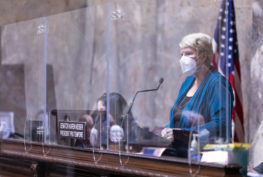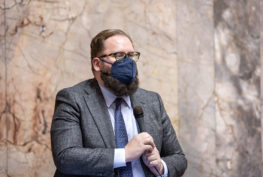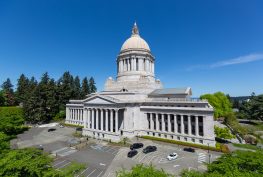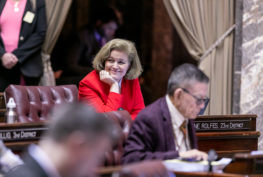FOR IMMEDIATE RELEASE: April 8, 2021
Legislature passes strongest recycling policy in nation
Legislation passed late Wednesday by the House would require increased recycled content in plastic beverage containers, trash bags and bottles for household and personal care products; ban expanded polystyrene food ware, recreational coolers and packing peanuts; and require that utensils, straws, cup lids and condiments only be provided to customers on request.
SB 5022, sponsored by Sen. Mona Das (D-Kent), is a leading-edge policy in a series of actions that the Washington state Legislature has taken to move toward climate change and pollution mitigation. The legislation builds on a bill Das championed in 2020 that banned thin plastic carry-out bags and required that thicker plastic bags consist of 40% post-consumer recycled content.
“The Washington Legislature has taken groundbreaking steps in recent years to address the problem of plastic, and continuing that progress is vital to the health of our communities and our planet,” said Das. “I am so proud that we’ve passed another tool to move us toward a cleaner, greener Washington – and I have been honored to work with my colleagues in the House and Senate, industry leaders, advocates, and community members to get this done.”
Addressing plastic and, especially, expanded polystyrene is popular with the public. A recent Public Policy Polling survey of bipartisan participants in Colorado, Florida, Maine and Washington state found that upwards of 76% would like to see more legislation to reduce plastic and water pollution. A majority (57%) of people surveyed say they support a statewide ban on foam takeout containers, while just 26% say they oppose it.
“Washington has been a national leader on addressing recycling and plastic pollution,” said Representative Liz Berry (D-Seattle), the sponsor of the House companion bill to SB 5022. “I hear from my constituents, and even my 5-year-old son who told me that garbage is the biggest threat to our oceans, that we must take urgent action. I am thrilled that the bill passed the House floor.”
SB 5022 would require beverage manufacturers to meet progressively greater levels of post-consumer recycled content in their plastic containers, averaged across all sales and distribution. This would apply to most beverages in containers sized between 2 ounces and a gallon and would exempt infant formula medical foods, or products related to oral nutrition and hygiene. It would also exempt some containers like refillable containers, wine bladders and medical products.
“This carefully crafted legislation positions Washington as national leader in breaking our radical, systemic addiction to single-use plastics,” said Sen. Reuven Carlyle (D-Seattle), another vocal advocate for climate solutions. “I deeply appreciate Sen. Das’ indefatigable efforts with environmental leaders and industry to find a path forward that encourages manufacturers to responsibly embrace greener, more sustainable consumer products.”
In regard to expanded polystyrene, the sale or distribution of packing peanuts would be prohibited beginning June 2023. Most portable coolers, food service ware and containers would be prohibited beginning June 2024. This expanded polystyrene prohibition is very similar to SB 6213, legislation that passed the Senate in 2020. The bill would also require that food service businesses provide plastic utensils, straws, condiment packaging and cup lids only upon request, beginning in 2022, with some exceptions made for things like hot beverage lids, drive-throughs and delivery services.
“We must continue to hold manufacturers responsible for the plastic pollution crisis, and this bill represents another key step in the Legislature’s work to address this threat to public health and our environment,” said Sen. Christine Rolfes (D-Bainbridge Island), who has been a champion for much of the environmental protection legislation that paved the way for SB 5022.
Since the Senate version of the bill was amended by the House, the two chambers must reconcile the differences before a final bill can be sent to the governor to be signed into law.
“Requiring plastic products to include recycled content will help create markets for our plastic recyclables,” said Rep. Joe Fitzgibbon (D-West Seattle), one of the House’s champions for bills that build a greener economy and protect the planet. “This virtuous cycle will conserve energy and natural resources. This bill is a major step towards reducing the unnecessary plastic waste that clogs our recycling and waste streams.”
“I was proud to introduce this bill to tackle the plastics crisis,” Das said. “At this point – in 2021, in a state that has consistently been at the cutting edge of new technology and sustainable development – we should not be manufacturing material that isn’t recycle, reusable or compostable.”





